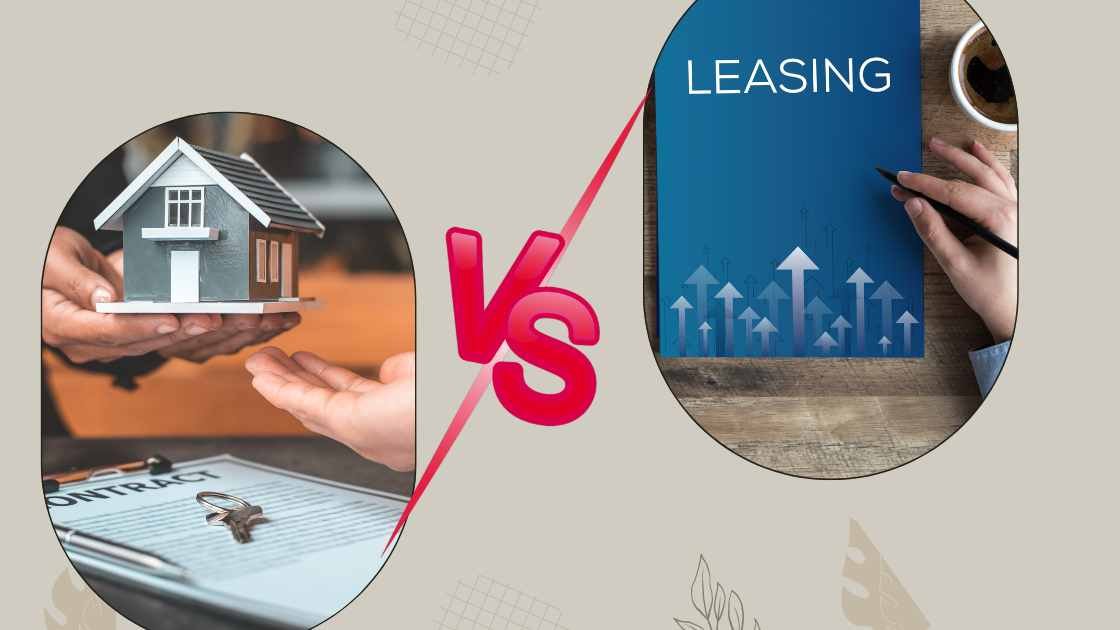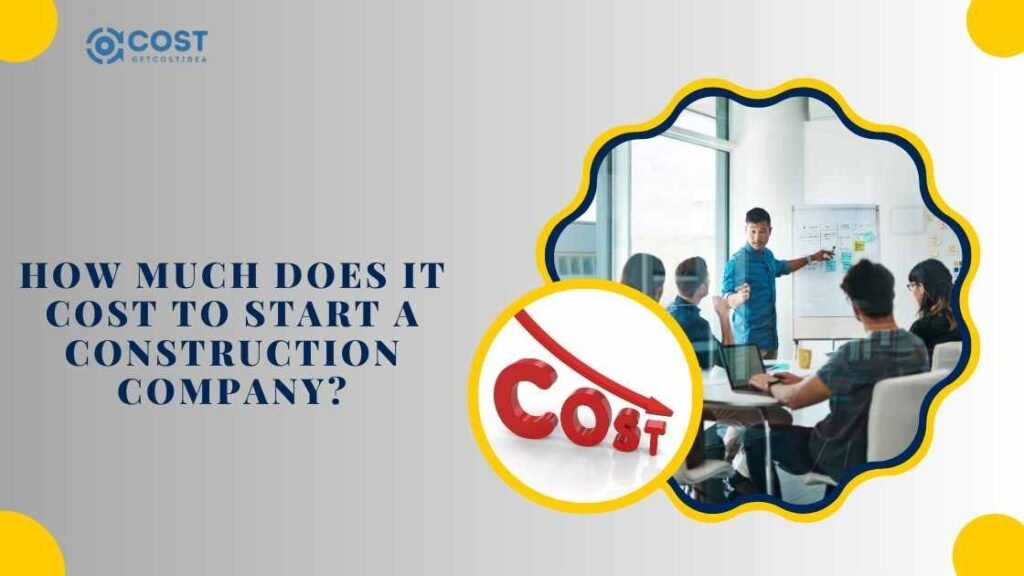Starting a construction company typically requires a capital ranging from $10,000 to $50,000. The exact cost will depend on the scale and scope of the business.
Starting a new venture in the construction industry requires meticulous planning and a solid financial foundation. The stakes involve considering initial expenses such as licensing, insurance, equipment, and staffing.
Crafting a successful construction company also demands a strategic approach to market analysis and the acquisition of a loyal customer base.

Starting a construction company demands a meticulous financial approach, where entrepreneurs dip into the intricacies of many expenditures such as vehicles, office space, and marketing initiatives.
How Much Does It Cost to Start a Construction Company is a pivotal question that necessitates a thorough analysis of budgetary requirements.
A robust and precise cost estimation becomes the bedrock for the nascent construction entity, serving as a strategic guide to navigate the competitive currents and facilitate the seamless expansion of operations.
Every fiscal decision made contributes to the foundation of long-term prosperity within the dynamic and bustling construction sector.
Setting The Foundation: Startup Costs

Starting a construction company is a solid way to start entrepreneurship. To lay a strong ground, Insight startup costs are vital. Diving into the construction business needs careful financial planning, and it’s essential to know the essential expenses.
Capital Estimates: From Equipment To Office Space
Capital is the fuel for your construction startup engine. You’ll need to invest in many assets to get your business off the ground. Below, find a breakdown of what you might expect to spend:
- Equipment: Heavy machinery like excavators, backhoes, loaders, and trucks can be costly. Prices vary based on whether you buy new, lease, or purchase used equipment. Leasing can lower upfront costs but may be more expensive in the long term.
- Office Space: The size and location of your office affect the price. Start with a space that accommodates your team and allows for minor expansions as your company grows.
- Tools and Supplies: Small tools and safety gear are a must. Bulk purchases might provide savings.
- Technology: Software for project management, accounting, and communication is essential for efficient operations. Cloud-based solutions offer flexibility with monthly or annual fees.
Legal Fees And Permitting: Budgeting For Bureaucracy
Legalities cannot be overlooked when launching your construction business. Here are some common costs involved:
| Legal Requirement | Cost |
|---|---|
| Business Registration | Varies by state/country |
| Licensing Fees | Depends on your services |
| Permits | Different for each project |
| Insurance | Required for protection against risks |
| Attorney Consultations | For contracts and legal advice |
Factor in the costs of acquiring the necessary licenses and permits. Construction insurance, a non-negotiable expense, protects against injuries and accidents. Do not forget regular consultations with an attorney to stay legally sound.
Diving Deep Into Equipment Expenses
Starting a construction company involves careful planning, especially when estimating equipment costs. In this section, we will break down the expenses involved in equipping your business.
Buying Vs. Leasing: Calculating Long-term Value

Deciding whether to buy or lease equipment is a critical financial choice. Each option has its pros and cons. Buying equipment means it’s yours forever but comes with higher upfront costs. Leasing offers lower initial expenses but could cost more over time. Compare the long-term value of both options carefully.
- Initial Investment: Spending large sums buying equipment could strain your budget.
- Maintenance Costs: Owning equipment adds repair and upkeep expenses.
- Flexibility: Leasing allows you to upgrade to the latest models more frequently.
Hand Tools To Heavy Machinery: Pricing Essentials
Construction equipment ranges from simple hand tools to complex heavy machinery. The price varies widely. Small tools may only cost a few dollars, while large machinery like excavators can cost tens of thousands.
| Tool Type | Cost Range |
|---|---|
| Hand Tools | $10 – $200 |
| Power Tools | $50 – $600 |
| Heavy Machinery | $10,000 – $100,000+ |
Account for these essentials as you draft your business budget. Consider both new and used options for your equipment needs. Quality and reliability guide your purchases, impacting your company’s performance and reputation.
Labor And Staffing: Investing In Workforce
One of the most critical aspects of starting a construction company involves your most valuable resource – your workers. Their skills and dedication can make or break the success of your business. To build a strong company base, it’s essential to know and cover team costs, training, and certification.
Recruitment Costs: Ensuring Quality Crew
Attracting skilled laborers and professionals to your construction firm involves strategic investment. You have to plan for job ads and think about interview and background check costs too.
Below is a brief breakdown of some potential recruitment costs:
- Job postings: Fees for listing on industry-specific job boards
- Interviewing: Time invested in screening candidates
- Background checks: Ensuring the safety and reliability of candidates
Training And Certification Expenses: Building Expertise
Quality work requires skilled professionals. Training your workforce and keeping certifications up-to-date is not just beneficial, but often mandatory in the construction sector. The types of training and approximate costs could include:
| Training/Certification | Cost Estimate |
|---|---|
| OSHA Safety Training | $100 – $200 per employee |
| Specialized Equipment Certification | $500 – $1,000 per employee |
| Continued Education | Varies by program |
Remember, educated and certified workers are an investment. They contribute to a safer work environment, quality construction, and satisfied clients.
Navigating The Insurance And Bonding Landscape
Starting a construction company involves more than just buying tools and hiring workers. It’s vital to navigate the complexities of insurance and bonding. These not only protect the business but also establish credibility with clients.
Types Of Insurance Policies: Protection Against Risk
Insurance is your safety net. It guards against unexpected events that can hit both your operations and finances hard. Let’s find the different policies needed for a construction business:
- General Liability Insurance: This covers injuries or damage to third parties.
- Workers’ Compensation: It provides benefits to employees who get injured on the job.
- Commercial Auto Insurance: This protects company vehicles and the employees who drive them.
- Property Insurance: It secures your office and equipment against theft or damage.
- Professional Liability Insurance: Also known as ‘errors and omissions’, this policy is for claims against work quality.
Each policy comes with its own cost, influenced by factors like coverage limits, business size, and risk level. Shop around and bundle policies where possible to save.
Bonding Requirements: Securing Trust On A Budget
Bonding fulfills legal requirements and builds trust with clients. It’s a promise that your company will perform the work as agreed. Here’s a look at what you might need:
| Bond Type | Usage | Typical Cost |
|---|---|---|
| License Bonds | Verify your business is licensed. | Varies by state and bond amount. |
| Bid Bonds | Guarantee your bid is serious. | Usually 1-5% of the bid amount. |
| Performance Bonds | Assure project completion. | Costs range from 0.5% to 2% of the contract value. |
| Payment Bonds | Ensure subcontractors and suppliers are paid. | Often bundled with performance bonds. |
Costs for bonds are often based on the owner’s creditworthiness and the project’s details. Improve your credit score and provide accurate project data to reduce these costs.
Marketing And Client Acquisition Spend
Kickstarting a construction company isn’t just about tools and talent. Marketing and client acquisition are vital for growth. The costs involved in these areas are essential. Let’s find the investments needed for branding and advertising and why they’re worth every penny for a budding construction firm.
Branding And Online Presence: Costs Of Visibility
A strong brand cuts through the noise of competition. Initial costs for branding include:
- Logo design: Professional logos range from a few hundred to thousands of dollars.
- Website development: Basic websites start around $500, while more intricate ones can hit $5,000+.
- SEO: Basic monthly SEO services could cost $500-$2000 for better search rankings.
- Social media setup: Setting up your profiles is free; investing in management tools or services starts at $20/month.
Remember, these are foundational investments. They pay off by making your company visible online.
Advertising Strategies: Calculating The Customer Acquisition Cost
Knowing your Customer Acquisition Cost (CAC) helps budget advertising. Here’s how:
- Track all marketing expenses over a specific time.
- Count the number of customers acquired in that period.
- Divide total spend by number of new clients.
| Expense Type | Monthly Cost |
|---|---|
| Online Ads (e.g., Google, Facebook) | $1,000-$5,000+ |
| Print Media (e.g., flyers, billboards) | $500-$2,000 |
| Networking Events | $100-$1,000 |
A balanced mix of online and offline advertising optimizes CAC. Allocate funds wisely for the best return.
Operational Costs And Overhead
Starting a construction company involves careful budgeting beyond initial capital. Operational costs and overhead are the ongoing expenses that keep your business active. These costs are vital for the success and growth of your company.
They encompass everything from the utilities at your office to the administrative tasks that occur daily. Let’s break down these costs to help you prepare a comprehensive budget for your construction business.
Facilities And Utilities: Keeping The Lights On
Facilities and utilities form a core part of your operational costs. At a basic level, your company needs a base of operations. This can be an office, warehouse, or yard for equipment and supplies.
| Type of Facility | Cost Factors |
|---|---|
| Office Space | Rent, location, and size |
| Warehouse | Storage needs, security |
| Equipment Yard | Accessibility, land cost |
Utility costs vary based on business size and location. Electricity, water, and communication services are examples. Remember to include costs for office equipment and technology that keep your operations running smoothly.
Administrative And General Expenses: The Price Of Running The Day-to-day
The daily operations of running your construction company come with their own set of costs. Administrative expenses are key to keeping the wheels turning, from staff salaries to office supplies.
- Payroll: Wages for administrative personnel
- Office Supplies: Stationery, software, and more
- Insurance: Coverage for liabilities and assets
- Professional Services: Accountants, lawyers
Marketing and advertising are also part of operational costs. Even a simple website or business card presence helps your construction company attract clients.
Anticipating Challenges And Hidden Expenses
Starting a construction company involves careful planning and budgeting. Not all costs are clear from the start. Future leaders in construction need to prepare for these unknowns. Let’s sink into the costs that can sneak up on you, and the safety nets you should have in place.
Contingency Funds: Preparing For The Unpredictable
When launching a construction firm, it’s essential to set aside contingency funds. These funds act as a financial cushion. They cover expenses that are not in your initial budget. Below are typical areas where unforeseen costs might arise:
- Material price hikes: Always changing, they affect your bottom line.
- Labor shortages: Finding skilled workers can cost more than planned.
- Equipment repairs: Machines break down, leading to expensive fixes.
- Permit delays: Waiting for approval can extend timelines and increase costs.
Financial experts recommend setting aside at least 10%-15% of the project cost. This is for unexpected situations. With this safety net, a construction business can navigate through storms that would otherwise cause financial distress.
Learning From The Unexpected: Case Studies

Real-life examples show why it’s smart to expect the unexpected. Here are brief case studies that illustrate this point:
| Company | Challenge | Hidden Costs | Outcome |
|---|---|---|---|
| BuildRight Inc. | Unexpected soil instability | $50,000 in geological surveys and reinforcements | The project was completed with a minor delay |
| TruConstruct | Severe weather damage to a worksite | $30,000 in repair and weatherproofing | The schedule was adjusted, project finished on budget |
These stories highlight the importance of keeping extra money on hand. Without it, companies can face tough choices, like cutting quality or halting construction. Being financially prepared is the key to a smooth operation and a successful business.
Starting a construction company involves various costs, and the financial landscape is essential for aspiring entrepreneurs. In the USA, the initial investment depends on factors like equipment, permits, and location. Typically, you might wonder, “How much do you need to start a construction company in the USA?” The answer varies, considering the scope of your operations and local regulations.
In the UK, the question of “How much does it cost to start a construction company in the UK?” is pertinent due to differing market conditions. In India, aspiring entrepreneurs may ask about the “minimum capital requirement for a construction company” and the necessary licenses.
For those with budget constraints, exploring “how much does it cost to start a construction company with no” or low capital is essential.
The “minimum capital requirement for a construction company” is vital for financial planning. Gaining insights into “how much small construction companies make” and “how much can you make owning your own construction company” aids in setting realistic expectations.
To navigate the complexities of starting a construction business, it’s vital to find the specific requirements in your target location, ensuring compliance and sustainable growth.
Frequently Asked Questions For How Much Does It Cost To Start A Construction Company
Are Construction Companies Hard To Start?
Starting a construction company can be challenging due to significant capital requirements, regulatory hurdles, and high competition. Experience in the industry and a solid business plan are vital for success.
How Much Do You Need To Start A Construction Company In Usa?
Starting a construction company in the USA typically requires a minimum of $10,000 to $50,000. This range varies depending on the size and scope of the planned operations, including equipment, licensing, and insurance costs.
Do Construction Company Owners Make Money?
Yes, construction company owners can make money. Profits vary based on the size of the company, project type, and market conditions. Effective management and cost control also influence earnings.
How Much Does It Cost To Build A Company?
The cost to build a company varies widely, ranging from hundreds to several hundred thousand dollars, depending on size, type, and location.
Conclusion
Starting on a construction company venture demands financial foresight. Exact costs vary but expect significant investment for equipment, licensing, and insurance. By planning extensively and budgeting wisely, aspiring entrepreneurs can lay a strong foundation for success in the competitive construction industry.
Start small, grow steadily, and build a future as solid as concrete.



2 thoughts on “How Much Does It Cost to Start a Construction Company?”
Pingback: How Much Does It Cost To Build A Pickleball Court?
Pingback: How Much Does It Cost To Travel To California?